Russia names its most influential women
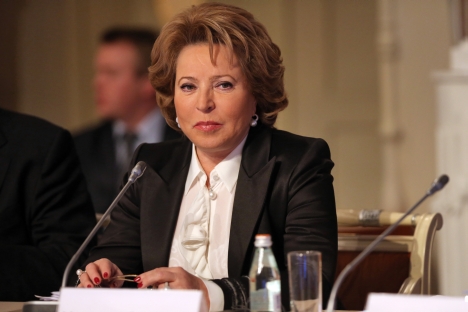
Federation Council Speaker Valentina Matviyenko is the most influential woman in Russia for 2012, according to Russia's leading media. Source: ITAR-TASS
{***From the Federation Council speaker to the prominent singer***}
The speaker of the Federation Council (upper house of Russia’s parliament), Valentina Matviyenko, topped the list of the 100 Most Influential Women in Russia for the second consecutive year, while third place went once again to Prime Minister Dmitry Medvedev’s spokesperson, Natalya Timakova. The rest of the list has changed greatly since last year.
Related:
A woman's place is in the Duma?
A class act when it comes to good causes
Echo Moskvy, RIA Novosti, Interfax and Ogonyokhave published their second annual list of the “100 Most Influential Women in Russia.” The 2012 list includes women who either influence decision-making in politics or business, because of the high positions they hold, or who, by virtue of their professional or social activities, shape people’s opinions.
A panel of 43 experts scored each candidate on a scale from one to 20. The panel included representatives from business, the media and politics. RBTH presents the top 10 women on the list below.
1. Valentina Matviyenko, 63, speaker of the Federation Council
Yevgeny Gontmakher, member of the board of Russia’s Institute of Contemporary Development:
“I’ve worked a lot with Valentina in the government. She is a very good person, and there are very few that can match her. Not many people know this, but she helped move an old people’s home out of Grozny in Chechnya — which was at war at the time — at the initiative of [Russian journalist and human rights activist] Anna Politkovskaya."
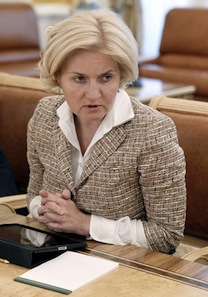 |
| Olga Golodets. Source: government.ru |
"Politkovskaya acted as a negotiator who managed to come to an agreement with the opposing party, and Valentina managed to agree with our party. It was an enormous challenge. They saved dozens of old people, who were moved from Grozny. There are many stories like this one.”
2. Olga Golodets, 50, deputy prime minister in charge of social issues
Vladimir Platonov, chair of Moscow City Duma:
“I know Golodets from our time working together in Moscow. She reported to the mayor on the most complicated issues, including social policy and healthcare. She responds to all kinds of challenges with enthusiasm, professionalism and promptness. I can say that she is generally regarded as being very effective at her job; many people are talking about her promotion, her career.”
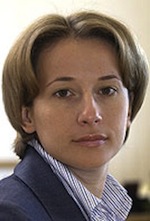 |
| Natalya Timakova. Source: kremlin.ru |
3. Natalya Timakova, 37, spokesperson for the Russian prime minister
Vyacheslav Terekhov, first deputy director of Interfax news agency:
“I’ve known Natalya for about 15 years, and I’m not surprised that she has achieved so much. She’s resolute and has her own point of view. I should give her credit for building on the good legacy of the Kremlin spokespeople, who have always been close to journalists: if she cannot take a call, she’ll always call you back or text you.”
4. Elvira Nabiullina, 49, presidential aide and former minister of economic development and trade
Nikolai Zlobin, director of the Russia and Asia Program at the World Security Institute (U.S.):
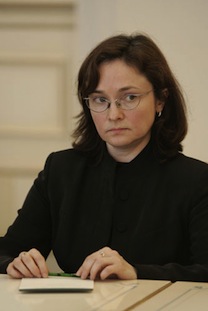 |
| Elvira Nabiullina. Source: kremlin.ru |
“She was a member — pretty much the leader — of the team that helped the Russian economy come through the worst phases of the economic crisis. Russia did suffer during the crisis, but it could have been much worse. She played a very important part and became a true international economic celebrity. As a government representative, economist and scholar, her opinion matters.”
5. Alla Pugacheva, 63, singer-songwriter and actress
Nikolai Baskov, singer:
“Even at her age, Alla Pugacheva is still a diva. She is 100-percent woman: smart, beautiful, sexy. She drives men crazy and can still do some crazy things.”
{***From the presidentoal aide to the high-profile journalist***}
6. Larisa Brycheva, 55, presidential aide
Arkady Dvorkovich, deputy prime minister:
“She has been head of the presidential administration’s legal department for many years, and she’s a great authority — even among those professionals, whose opinions are often more opposite than weather forecasts.”
7. Olga Yegorova, 57, chair of Moscow City Court
Mikhail Barshchevsky, plenipotentiary representative of the government in the highest courts:
“She is, without a doubt, a most competent judge. And she is not a bureaucrat. She knows the law and treats it as an expert, not as a blind executor. Olga is also a very open and sincere person, and that is very important.”
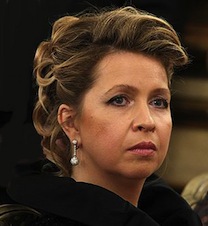 |
| Svetlana Medvedeva. Source: kremlin.ru |
8. Svetlana Medvedeva, wife of Prime Minister Dmitry Medvedev and head of the board of trustees for the Spiritual and Moral Culture of the Younger Generation of Russia program
Leonid Slutsky, chair of the State Duma Committee on CIS and Compatriots:
“I was lucky to work under her guidance on the restoration of the great shrine of the Russian Orthodox Church and the Navy — the Naval Cathedral of Saint Nicholas in Kronstadt — which will be consecrated in late May. She is a wonderful and kind person. She doesn’t look for quick-fixes and easy projects.”
9. Chulpan Khamatova, 37, actress, one of the founders of the Gift of Life charity
Ilya Averbukh, figure skater, coach and producer of ice pageants:
“Meeting her was a true gift, because Chulpan is a deep, cultured and interesting person.”
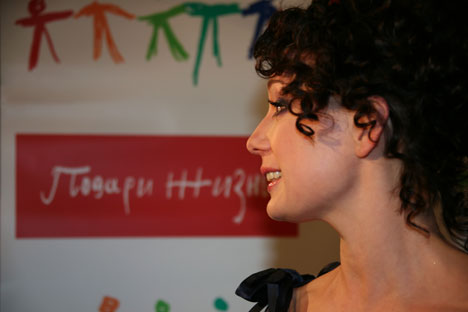
Chulpan Khamatova is Russian prominent actress and a co-founder of 'Podari Zhizn' (Gift of Life) charity organization. Source: RIA Novisti.
10. Svetlana Mironyuk, 45, editor-in-chief of RIA Novosti
Evgeniy Yasin, professor of economics and director of research at the Higher School of Economics:
“In her very high position, she manages to find a compromise between the demands of the authorities and the demands of journalists that seek freedom of speech and opportunities to voice their opinions. She does this better than anyone else.”
This combined report is based on materials from Ogonyok, RIA Novosti and Echo of Moscow.
{***New opportunities and challenges for working women by Maria Portnyagina, Ogoniok ***}
New opportunities and challenges for working women
By Maria Portnyagina, Ogoniok
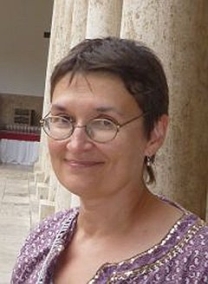 |
| Yelena Iarskaya-Smirnova. Source: Kommersant |
Women in today’s Russia have the opportunity to influence society from a range of different professional spheres. However, Russia’s working women still have to deal with gender segregation, income-based segregation, nepotism and social stigmatization.
Yelena Iarskaya-Smirnova, a professor at Moscow’s Higher School of Economics, talks to Ogonyok correspondent Maria Portnyagina about the road to the top for Russian women.
Ogonyok: What, in your opinion, determines how much influence a woman has in Russia?
Yelena Iarskaya-Smirnova: Influence, above all, implies that you yield some kind of power — that you have the ability to use leverage and the opportunity to make a difference in decision-making. Female government ministers, CEOs of large companies, pop stars, TV personalities, philanthropists and activists all influence society in different ways.
Have a look at the top 10, and you’ll see that “influence” in our country is tightly intertwined with the vertical of power, while the weight and importance of civic society forces and NGOs are low.
Ogonyok: In what professional areas are Russian women catching up with — or maybe even overtaking — men?
Y.I.: Women today are successful in a broad range of areas, and they are doing better than men in fields where they don’t have to compete with men. Of course, there are women who are doing as well as or even better than men in certain areas — but gender segregation in employment persists.
Female airline pilots, sea captains and surgeons normally elicit remarks along the lines of “this is an exception” or “is this even a good idea?”
As in the Soviet era, our women are still better educated than men; they strive to finish high school and receive the best professional training possible. Still, the share of women in leadership positions remains low.
At the same time, the share of women who manage businesses is rising in Russia. Women accounted for 46 percent of executives in Russian firms in 2012 — a 10 percent increase from 2011 (according to a poll of 100 Russian companies by international consultancy firm Grant Thornton International).
But what positions exactly do women hold in business? The distribution dates back to the Soviet era and is traditional for the public sector: chief accountant, CFO, or HR director.
It’s worth noting, however, that the gender gap is narrower in large cities.
Ogonyok: What’s your take on men’s role in the achievements of women? Does patronage exist?
Y.I.: Any discussion of professional success must take the person’s background into account: family background, place of birth, where they grew up and what kind of social support they received.
The way things work here, we can say that you can only make it to the top if you have the right background. I’m not just talking about money; you’ve got to have the right connections and the pedigree. It’s no secret that the laws of honest bureaucracy — that is, of meritocracy — often don’t apply in Russian public and business organizations. It’s relatives of influential people (both men and women) who get promoted to leadership positions.
Income-based segregation plays a role, too. Post-Soviet Russia has prestigious, private educational institutions, and studying abroad has become accessible, with the result being that family wealth increasingly determines opportunities for self-realization.
Ogonyok: Women with actual clout within their respective areas are believed to shy away somewhat from publicity. Is this correct?
Y.I.: I’m not sure that it is. Women working in business or government get their fair share of coverage in the media. But there is another problem here: when they write about businessmen, it’s all about their job. But when they write about businesswomen, it’s about their love lives, marriages, divorces and children.
This fits well the traditionalist models of how women are perceived and the stereotypes about their true calling and role in life. On the other hand, it’s very important to discuss the work-life balance — to show examples of successful people who have managed to balance their careers with family life, or opportunities for choosing between the two. But women who dedicate themselves to their career should not be stigmatized.
The interview is first published in Russian in the Ogoniok magazine.
All rights reserved by Rossiyskaya Gazeta.
Subscribe
to our newsletter!
Get the week's best stories straight to your inbox